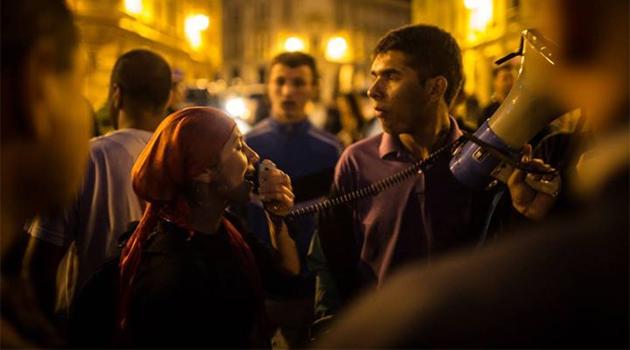I disagree with most of the opinions expressed in the piece entitled "Commentary: Some Romani activists are spreading anti-Romani sentiment", which has recently been published on Romea.cz. In that article the author attacks in an ugly, sometimes chauvinist, and vulgar way an activist from the Konexe association, my friend Ivana Mariposa Čonková.
I feel the need to respond and stand up for Ivanka. She deserves it.
I spent all of 2013 with Ivanka. I know her work.
We have faced many crisis situations together, such as when we supported families from the Předlice neighborhood who had been evicted into residential hotels charging usurious rents, as well as other families in similar situations, or when we did our best to prevent disorderly mobs from reaching Romani houses and to calm the crying and frightened children and their parents in those houses, or when we taught impoverished communities how to organize themselves. There are several things that are exceptional about Ivanka in the Czech context.
In the first place, she is a Romani activist. Even though today the term "activist" has become popular and widespread, there are almost no Romani activists in the Czech Republic.
I can count the number of such people on the fingers of one hand. An activist is a person who, without seeking reward and by deploying their personal skills, actively helps those in need and does his or her best to change the reality of society.
Pro-Romani activism in the Czech Republic often involves personal danger, inconvenience, and at the very least, the rancor of the antigypsyist majority. One is not an activist just by being active, for example, on the Internet.
Another extraordinary thing about Ivanka is that she does not believe in and explicitly rejects the generally-accepted antigypsyist myth that Romani people are to blame for anti-Romani hatred. This myth claims that if Romani people had only behaved "better" in the past and "adapted", there would be no antigypsyism and no one would have anything against them.
Unfortunately, some well-integrated Romani people also believe this myth, and it has become a complex for them. When such people encounter discriminatory or racist behavior against them, they do not blame antigypsyism (i.e., pathological hatred of Romani people), but those "bad, dirty, inadaptable, thieving" Romani people whose behavior is spoiling things for everyone else with the gadje [non-Roma].
According to the opinions expressed by this kind of Romani person, the role of the Romani elite should primarily consist of apologizing for the ugly behavior of impoverished Romani people, of criticizing them, and of rejecting them by insisting on the existence of other, "decent" Romani people – such as themselves. Naturally, Ivanka, who is so self-assured, who is breaking down these antigypsyist complexes, myths and prejudices, who is always unequivocally on the side of the impoverished, whose activity shows up others’ passivity, is like a red flag to a bull for such people.
Ivanka’s work in the field may not be so visible on Facebook or elsewhere online, but one thing is certain: She has become a respected, well-known figure in many impoverished Romani communities throughout the country and enjoys their great support. She has the support of impoverished Romani people from the ghettos, she represents their interests and fights for their rights – and that is another thing that is exceptional about her.
